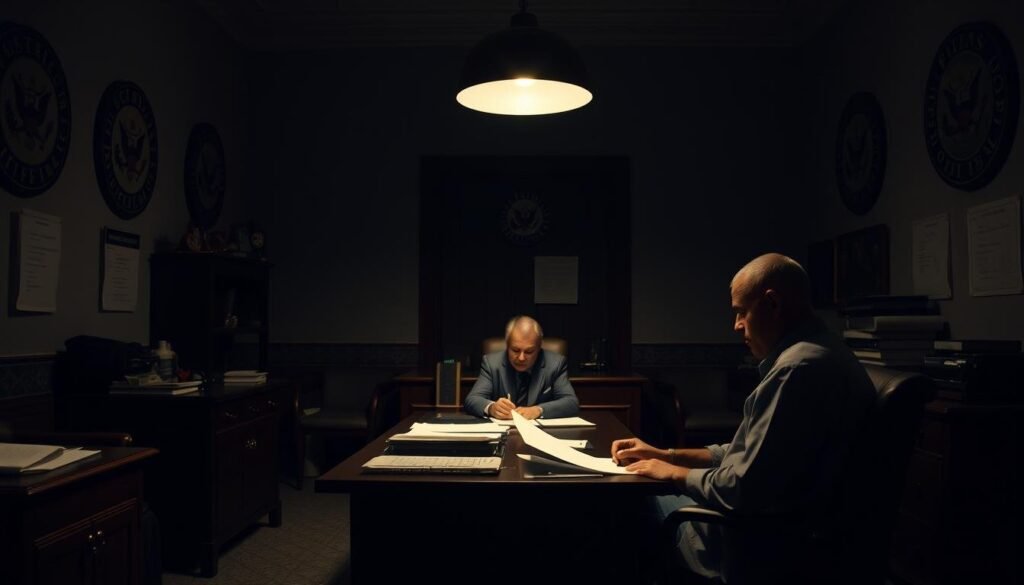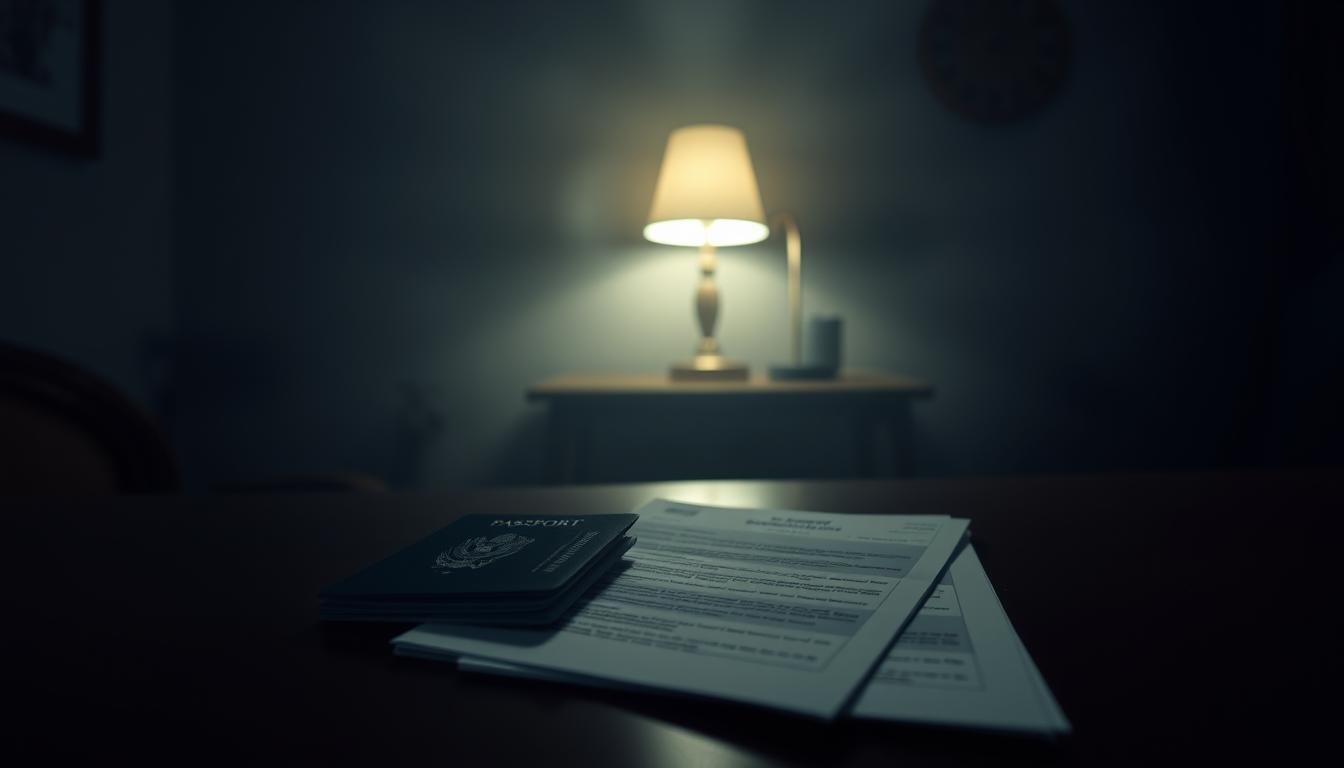Last updated on October 18th, 2025 at 06:56 pm
Can a Non-Violent Felon Get a Passport? If you’re a U.S. citizen with a felony, you might wonder about getting a passport. The rules for felon passport eligibility are complex. It’s important to understand them for international travel.
The U.S. Department of State has clear guidelines for felons wanting a passport. Some felonies might not affect your eligibility. But, others could make it hard to get or renew a passport.
Knowing the U.S. passport rules for felons is key. Usually, felons can get a passport unless their crime is serious. This includes drug offenses or crimes against international travel or narcotics trafficking.
Contents
- 1 Understanding U.S. Passport Eligibility Basics
- 2 Can a Non-Violent Felon Get a Passport?
- 3 Specific Passport Restrictions for Felons
- 4 The Passport Application Process for Felons
- 5 Overcoming Passport Challenges for Non-Violent Felons
- 6 Conclusion: Can a Non-Violent Felon Get a Passport?
- 7 FAQ
- 7.1 Can I apply for a passport if I have a non-violent felony conviction?
- 7.2 How do I know if my felony is considered non-violent for passport purposes?
- 7.3 Will a felony conviction on my record affect my passport application?
- 7.4 Do I need to disclose my felony conviction on my passport application?
- 7.5 Can I expedite my passport application if I have a felony conviction?
- 7.6 How long does it take to process a passport application for someone with a felony conviction?
- 7.7 Can a pardon or expungement of my felony conviction help with my passport application?
Understanding U.S. Passport Eligibility Basics
Before we dive into how a felony conviction affects passport eligibility, let’s cover the basics. The U.S. passport application process has rules for everyone. These rules don’t change based on your background.
To get a U.S. passport, you must meet certain criteria. You need to be a U.S. citizen, at least 16 years old for first-time applicants, and show proof of identity and citizenship.
Let’s break down these requirements further.
- You must be a U.S. citizen, either by birth or naturalization.
- You need to provide proof of identity, such as a driver’s license or government-issued ID.
- Citizenship is typically proven with a birth certificate or naturalization certificate.
- If you’re applying for a child under 16, different rules apply, including the requirement for both parents to provide consent.
Knowing these U.S. passport requirements is key. It helps you prepare the right documents and meet the criteria. This makes your application smoother.
A felony conviction might affect your passport application. But, it’s not a total block. The type of felony and any court orders or probation can play a role in your application.
Understanding the basics of U.S. passport eligibility helps. It prepares you for the application process, even with a non-violent felony.
Can a Non-Violent Felon Get a Passport?
Can people with non-violent felony convictions get a U.S. passport? It depends on the type of felony and any legal issues after that.
It’s important to know the difference between violent and non-violent felonies. Non-violent felonies are crimes that don’t hurt others, like white-collar crimes or drug offenses.
Differentiating Between Violent and Non-Violent Felonies
How a felony is seen as violent or non-violent affects your passport chances. The U.S. government looks at the felony type when checking passport applications.
| Felony Type | Examples | Passport Eligibility |
|---|---|---|
| Non-Violent | Drug offenses, white-collar crimes | Generally eligible, but depends on court orders or probation terms |
| Violent | Assault, robbery, murder | May be ineligible due to federal or state restrictions |
If you’re a non-violent felon, your passport chances might be affected by court orders or probation. It’s key to check your situation to see if you can get a passport.
For non-violent felons, getting a passport means understanding your conviction and any legal limits. Meeting all the requirements can help you travel abroad.
Specific Passport Restrictions for Felons
If you’re a felon, knowing how your record affects passport eligibility is key. The U.S. has rules for felons applying for passports.
It’s all about whether your crime lets you travel abroad. Some felonies can block you from getting a passport.
Types of Felonies That May Affect Passport Eligibility
Not all felonies are the same when it comes to passports. Here are some that might affect your application:
- Drug trafficking convictions
- Felonies related to international child abduction
- Convictions for treason or espionage
These crimes might stop you from getting a passport or take it away if you have one.
The rules for felons and passports are complex. The main laws include:
| Law/Regulation | Description | Impact on Felons |
|---|---|---|
| 22 U.S.C. § 2714 | Prohibits passport issuance for certain drug offenders | Denial of passport for drug trafficking convictions |
| International Child Abduction Act | Restricts travel for individuals with international child abduction convictions | Potential denial or revocation of passport |
| Espionage Act | Governs passport eligibility for individuals convicted of espionage | Potential denial or revocation of passport |
Knowing these laws can help you through the passport application as a felon.
The Passport Application Process for Felons
Getting a passport with a felony conviction can seem hard, but it’s doable with the right info. Felons can get a passport, but they must follow a certain process.
You’ll need to collect the needed documents first. These include proof of citizenship, ID, and a copy of your ID’s both sides. It’s key to make sure all documents are right and complete to avoid delays.

| Document | Description | Example |
|---|---|---|
| Proof of Citizenship | Document showing you are a U.S. citizen | Birth Certificate, Naturalization Certificate |
| Identification | Valid or expired ID | Driver’s License, State ID, Military ID |
| Passport Application Form | Completed Form DS-11 | Downloaded from the U.S. Department of State’s website |
With your documents ready, fill out the DS-11 form. This is the form for a U.S. passport. Make sure to fill it out right and sign it. You’ll also need to provide a copy of both sides of your ID.
After you have everything, visit a passport acceptance facility. There, you’ll submit your application, pay the fee, and have your photo taken. Be ready to talk about your felony conviction if asked.
Some felony convictions might need extra checks or could deny your passport. For example, crimes like drug trafficking or international crimes might affect your eligibility.
Tips for a Successful Application
- Ensure all information is accurate and matches your other documents.
- Provide all required documents to avoid delays.
- Be prepared to discuss your felony conviction.
- Use a secure method to submit your application.
By following these steps and knowing the possible challenges, you can apply for a passport with a felony conviction successfully.
Overcoming Passport Challenges for Non-Violent Felons
You can successfully navigate the passport application process as a non-violent felon by being informed and prepared. Understanding the specific requirements and potential challenges is key to overcoming obstacles.
When applying for a passport with a non-violent felony conviction, it’s essential to be aware of the potential issues you may face. One of the primary concerns is the level of scrutiny your application may undergo. To mitigate this, ensure that your application is thorough and accurate, providing all required documentation.
Here are some strategies to help you overcome common challenges:
- Seek legal assistance from an attorney specializing in passport applications for individuals with felony convictions.
- Ensure you have all necessary documentation, including proof of citizenship, identification, and any relevant court documents.
- Be prepared to address any concerns or issues raised by the passport agency.
Legal assistance can play a crucial role in the passport application process for non-violent felons. An experienced attorney can help you understand your rights and the specific requirements for your situation. They can also assist in preparing your application to minimize potential issues.
- Apply well in advance of your travel dates to account for any potential delays.
- Use a passport application service that specializes in complex cases, if necessary.
- Keep detailed records of your application and any correspondence with the passport agency.
By being proactive and informed, you can increase your chances of a successful passport application.Staying calm and patient throughout the process is also crucial, as it can be lengthy and sometimes unpredictable.
In conclusion, while having a non-violent felony conviction may present additional challenges when applying for a passport, it is not an insurmountable barrier. With the right strategies, legal assistance, and a thorough understanding of the application process, you can overcome these challenges and obtain a passport.
Conclusion: Can a Non-Violent Felon Get a Passport?
Getting a passport as a non-violent felon can be tough. But knowing the rules and how to apply can make it easier.
Non-violent felons can still get a passport, even with some limits. It’s important to know these rules and how to deal with any problems during the application.
If you’re a non-violent felon wanting a passport, remember a few key things. Make sure you qualify, collect all needed documents, and fill out your application correctly. This way, you’ll have a better chance of getting your passport and traveling abroad.
See Also: Can a Convicted Felon Serve on Jury Duty?
FAQ
Can I apply for a passport if I have a non-violent felony conviction?
Having a non-violent felony conviction doesn’t always mean you can’t get a U.S. passport. The U.S. Department of State looks at each case differently. They consider the type of crime and if there are any other legal issues.
How do I know if my felony is considered non-violent for passport purposes?
The U.S. Department of State checks the details of your conviction to decide if it’s non-violent. Crimes like tax evasion or mail fraud are often considered non-violent. But, it’s best to talk to the U.S. Department of State or a lawyer to be sure.
Will a felony conviction on my record affect my passport application?
A felony conviction might affect your passport application, but it’s not a definite no. The U.S. Department of State will look at your conviction, your current legal status, and other things.
Do I need to disclose my felony conviction on my passport application?
Yes, you must tell the truth about any felony convictions on your passport application. Not telling the truth can lead to your application being denied or your passport being taken away.
Can I expedite my passport application if I have a felony conviction?
You can pay extra for expedited service, but having a felony conviction doesn’t automatically get you this. You’ll need to follow the usual steps and might have to provide more information.
How long does it take to process a passport application for someone with a felony conviction?
Processing times can be longer for people with felony convictions because of extra checks. It’s a good idea to check with the U.S. Department of State for the latest times and plan ahead.
Can a pardon or expungement of my felony conviction help with my passport application?
Getting a pardon or expungement might help your chances of getting a passport. It can lessen the impact of your conviction. But, the U.S. Department of State will still review your application carefully.

Van Maldonado, born in California, holds a degree in Criminology and Police Science. Currently serving as an investigative officer at a local police station, he spends his leisure time writing insightful content for FelonScope.com.

